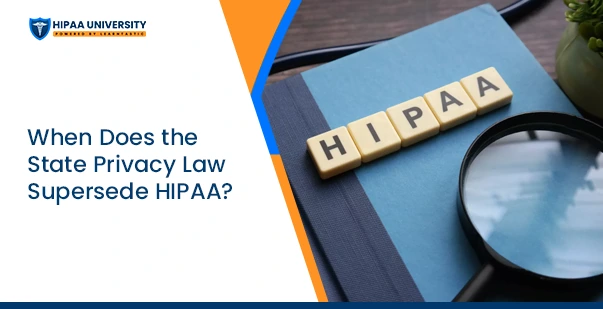When Does the State Privacy Law Supersede HIPAA?

September 20, 2024
Table Of Content(s)
- Introduction
- Overview of HIPAA & State Privacy Laws
- Scenarios where state privacy laws offer more strict protections than HIPAA
- Key Differences Between State Privacy Laws and HIPAA
- Legal Consequences of Non-Compliance: HIPAA & State Privacy Laws
- When does a state or federal law preempt HIPAA?
- Conclusion
Understanding the intersection of state privacy laws and HIPAA can be a complex challenge. While HIPAA (the Health Insurance Portability and Accountability Act) sets national standards for safeguarding patient information, state privacy laws can sometimes add an extra layer of protection. It can also at times supersede federal regulations. If you have the question “when does a state privacy law supersede HIPAA”, you have come to the right place.
Understanding when state law takes precedence helps with better compliance and enforces trust within patients. A National Conference of State Legislatures study found that 48 states have enacted their own privacy laws. This provides stricter protections than HIPAA. For instance, California’s Consumer Privacy Act (CCPA) introduces requirements that include those outlined by HIPAA, offering enhanced control over personal data. In this blog, we’ll unravel this legal puzzle. By the end of this you will have clear insights into how and why state laws might overshadow federal standards.
Overview of HIPAA & State Privacy Laws
Understanding the interplay between federal and state regulations is more crucial than ever. While HIPAA sets a nationwide standard for protecting patient information, state privacy laws add layers of protection that at times override federal guidelines. Here’s a closer look at both:
HIPAA (Health Insurance Portability and Accountability Act)
- Purpose: Establishes national standards for the protection of health information.
- Coverage: Applies to healthcare providers, insurers, and their business associates.
- Key Provisions: Ensures confidentiality, integrity, and security of protected health information (PHI); mandates patient rights to access and amend their health records.
State Privacy Laws
- Purpose: Varies by state, often providing more stringent protections than HIPAA.
- Coverage: Can include broader definitions of personal data and more rigorous consent requirements.
- Examples: California’s CCPA, New York’s SHIELD Act, and Massachusetts’ data privacy laws.
- Key Provisions: Enhanced consumer rights, more specific data protection measures, and stricter breach notification requirements.
Read More: How Often Is HIPAA Training Required?
Scenarios where state privacy laws offer more strict protections than HIPAA
HIPAA provides a solid foundation for safeguarding patient information across the U.S. But many states have enacted privacy laws that exceed its requirements. These state laws can offer enhanced protections, reflecting the growing concern over personal data security. Here’s a look at some scenarios where state privacy laws provide stricter safeguards:
- Broader Definition of Personal Data
California’s CCPA expands the definition of personal data to include information such as IP addresses, browsing history, and purchase behavior, which are not covered by HIPAA.
- Enhanced Consent Requirements
In some states, like Colorado with its Colorado Privacy Act (CPA), companies must obtain clear consent before collecting or processing sensitive data, offering more control to individuals over their information.
- Stricter Data Breach Notification Requirements
Massachusetts’ data privacy laws require businesses to notify affected individuals of a breach within a specific timeframe, often shorter than HIPAA’s requirements, and to provide free credit monitoring services.
- Extended Privacy Rights
The New York SHIELD Act gives consumers the right to request the deletion of their data, a right not explicitly provided under HIPAA.
- Higher Penalties for Non-Compliance
State laws such as the CCPA impose significant fines and penalties for violations, which can be higher than those under HIPAA, enhancing the financial incentives for compliance.
Read More: What is a HIPAA Authorization Form and When is it Needed
Key Differences Between State Privacy Laws and HIPAA
HIPAA sets the baseline for protecting health information across the U.S. State privacy laws often follow more strict regulations. Let’s find out the key differences:
| Point Of Differentiation | HIPAA | State Laws |
| Personal Data | Focuses specifically on protected health information (PHI) within the healthcare industry. | Can cover a broader range of personal data, including financial, biometric, and online activity information. |
| Consent Requirements | Implies consent for the use and disclosure of PHI, with specific exceptions for treatment, payment, and operations. | Often require explicit, opt-in consent for data collection and processing, providing individuals with more control. |
| Data Access and Correction Rights | Grants patients the right to access and amend their health records. | May extend these rights to include broader data access and correction provisions beyond just health information. |
| Breach Notification | Requires notification of breaches affecting 500 or more individuals, with specific timeframes. | Can mandate more immediate notification and offer additional requirements, such as providing credit monitoring services. |
| Enforcement and Penalties | Enforced by the Department of Health and Human Services (HHS) with penalties that can vary based on the severity of the violation. | Often feature their own enforcement mechanisms and can impose higher fines and penalties for non-compliance. |
Legal Consequences of Non-Compliance: HIPAA & State Privacy Laws
Failing to abide by privacy regulations can lead to serious legal repercussions. This is applicable for both HIPAA and state privacy laws. Organizations must be strict and cautious in maintaining compliance. Here’s a look at the potential penalties for non-compliance with HIPAA and state privacy laws:
HIPAA Violations
- Civil Penalties:Ranges from $100 to $50,000 per violation, with an annual maximum of $1.5 million, depending on the level of negligence.
- Criminal Penalties: Can include fines up to $250,000 and imprisonment for up to 10 years for severe violations such as knowingly disclosing PHI for personal gain.
- Reputational Damage: Publicized violations can harm an organization’s reputation and erode patient trust.
State Privacy Law Violations
- California CCPA: Fines up to $7,500 per violation, with potential lawsuits from individuals for damages.
- New York SHIELD Act: Penalties can be up to $500 per violation with a maximum of $10,000 per incident, along with potential class action lawsuits.
- Massachusetts Data Privacy Laws: Non-compliance can lead to fines and mandated corrective actions, such as enhanced data protection measures and notifications.
Increased Scrutiny and Compliance Costs
- Regulatory Audits: Increased likelihood of audits and investigations following a violation.
- Legal Fees: Costs associated with legal defense, settlements, or remediation efforts.
When does a state or federal law preempt HIPAA?
Understanding when state or federal laws can preempt HIPAA is crucial for ensuring comprehensive compliance. Here are key scenarios where this preemption can occur:
- State Law Preemption
Stricter Protections: State laws that provide more stringent privacy protections than HIPAA generally take precedence. For example, California’s CCPA offers broader data protection and consumer rights, which can override HIPAA in certain cases.
Specific Provisions: State laws with specific provisions related to the health information not addressed by HIPAA may preempt federal standards if they offer additional safeguards.
- Federal Law Preemption
Conflicting Federal Regulations: When a federal law directly conflicts with HIPAA or imposes additional requirements, the federal law typically preempts HIPAA. For example, federal laws like the 21st Century Cures Act, which deals with information blocking and interoperability, can impact how HIPAA is applied.
Overriding Federal Statutes: In cases where federal laws mandate specific privacy protections or obligations that are inconsistent with HIPAA, those federal statutes can take precedence.
- Intersection of Laws
Complementary Regulations: If state or federal laws supplement HIPAA without conflicting, both sets of regulations must be followed. For example, laws addressing specific types of data (like genetic information) may coexist with HIPAA provisions.
Conclusion
To understand- “when does a state privacy law supersede HIPAA”, it is important to navigate through the complex healthcare policy landscape. State laws can merge with HIPAA in various ways. This includes broader definitions of personal data, imposing stricter consent and notification requirements. At times, it also includes enhanced privacy rights. Therefore it is important for healthcare providers and organizations to stay aware of both federal and state regulations. Your proactive approach will help prevent legal repercussions to maintain complete data privacy.





